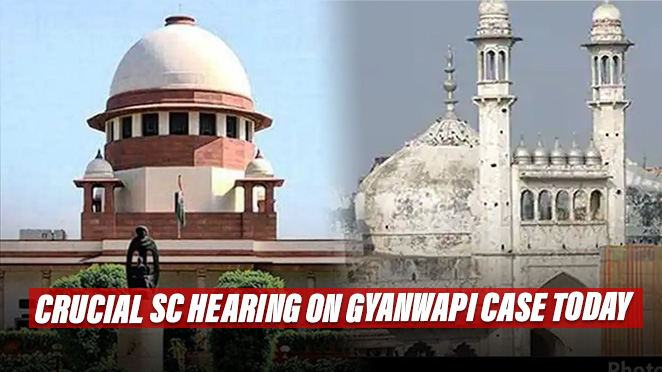
Yesterday, a Varanasi court directed the district administration to seal the spot inside the complex where allegedly ‘shivling’ has been found by the filming team, and the news flooded all the digital and social media platforms as well as the news channels.
Amidst this, today the Supreme Court is scheduled to hear on the plea of the management of Gyanvapi mosque against the survey of the Gyanvapi-Shringar Gauri complex in Varanasi, Uttar Pradesh. As per the updated list of business of the Supreme Court for Tuesday, a bench of Justices D Y Chandrachud and P S Narasimha would be hearing the plea of the Committee of Management Anjuman Intezamia Masjid, which manages the affairs of Gyanvapi mosque in Varanasi. The written order, passed on Friday by a bench headed by Chief Justice N V Ramana, had ordered the listing of the plea before a bench headed by Justice Chandrachud.
Though, on Friday, the bench had refused to pass any interim order of status quo against the ongoing survey of the religious complex on the plea of the Muslim side, but the CJI-led bench had agreed to consider listing the plea for hearing.
“Upon being mentioned by Huzefa Ahmadi, senior counsel appearing on behalf of the petitioner, we deem it appropriate to direct the Registry to list the matter before the bench presided over by Dr. Justice D Y Chandrachud,” the bench, also comprising Justices J K Maheshwari and Hima Kohli had said in its order.
The mosque’s management committee – Anjuman-e-Intezamia – had moved the Supreme Court last week seeking a stay on the survey as well as on the proceedings at the Varanasi civil court. While the survey and videography proceedings have been completed, the Muslim side is hopeful of a favourable order – a stay on the proceedings and not make the survey and its report public.
The plea argued that the fresh suits filed in 2021 citing the “right to Worship” were “barred by the 1991 Places of Worship Act” and were an attempt to revive the dispute which had been put to rest by this law. According to this argument, the 1991 Act had created vested rights and status quo in the Kashi temple-mosque issue and the Places of Worship Act made it clear that “the religious character of a place of worship existing on the 15th day of August, 1947 shall continue to be the same as it existed on that day.” The only exception to this law had been granted to the Ayodhya Ram Janmabhoomi.
Stating that the nature and character of a place of worship cannot be changed as enshrined in The Places of Worship Act, 1991, and Supreme Court’s Ayodhya judgment that sought to impose an obligation to maintain its religious character as on August 15, 1947, AIMIM president Asaduddin Owaisi on Monday called upon Muslims to take a vow not to lose another mosque after Babri.




